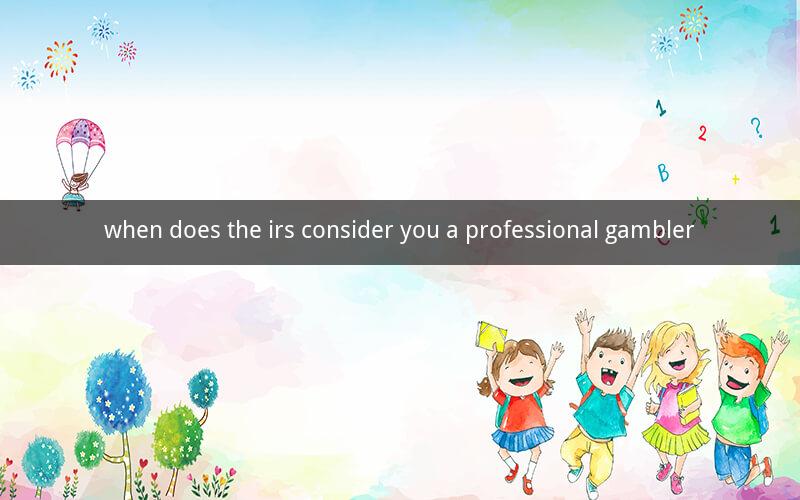
Table of Contents
1. Understanding the IRS Definition of Professional Gambler
2. Factors the IRS Considers in Determining Professional Gamblers
3. Tax Implications for Professional Gamblers
4. Record Keeping and Documentation for Professional Gamblers
5. Reporting Gambling Income to the IRS
6. Deductions Available to Professional Gamblers
7. Tax Planning Strategies for Professional Gamblers
8. Penalties for Failing to Report Gambling Income
9. Seeking Professional Advice for Taxation of Gambling Income
10. Conclusion
1. Understanding the IRS Definition of Professional Gambler
The Internal Revenue Service (IRS) defines a professional gambler as someone who engages in gambling activities as a trade or business. This means that the individual's primary source of income comes from gambling, and they are actively engaged in the gambling industry. Understanding this definition is crucial for individuals who earn a living through gambling to ensure they comply with tax regulations.
2. Factors the IRS Considers in Determining Professional Gamblers
To determine whether an individual qualifies as a professional gambler, the IRS considers several factors:
Nature of the Activities: The individual must engage in gambling activities regularly and continuously.
Profit Motive: The individual must have the intention of making a profit from gambling.
Amount of Time Spent: The individual must dedicate a significant amount of time to gambling activities.
Risk of Loss: The individual must incur substantial risks in their gambling activities.
3. Tax Implications for Professional Gamblers
Professional gamblers must report all of their gambling income on their tax returns. This income is subject to income tax, and the individual must pay self-employment tax if they are self-employed. Additionally, professional gamblers may be eligible for certain deductions and credits.
4. Record Keeping and Documentation for Professional Gamblers
Professional gamblers must maintain detailed records and documentation of their gambling activities. This includes receipts, tickets, and other proof of income and expenses. Keeping accurate records is essential for tax preparation and to substantiate deductions.
5. Reporting Gambling Income to the IRS
Gambling income must be reported on Schedule C (Form 1040) or Schedule C-EZ (Form 1040). The individual must report all winnings, including cash, prizes, and other forms of compensation. It is important to note that losses can only be deducted if they exceed the amount of winnings reported.
6. Deductions Available to Professional Gamblers
Professional gamblers may be eligible for certain deductions, such as:
Travel and Lodging Expenses: Expenses incurred while traveling for gambling purposes.
Vehicle Expenses: Expenses related to the use of a vehicle for gambling purposes.
Entertainment Expenses: Expenses related to entertaining clients or potential clients while gambling.
Insurance Premiums: Premiums paid for insurance covering gambling activities.
7. Tax Planning Strategies for Professional Gamblers
Professional gamblers can implement several tax planning strategies to minimize their tax liability, such as:
Timing Deductions: Timing deductions can help reduce taxable income in a particular year.
Retirement Contributions: Contributions to retirement accounts can provide tax advantages.
Health Insurance Premiums: Premiums paid for health insurance can be deductible.
8. Penalties for Failing to Report Gambling Income
Failing to report gambling income can result in penalties and interest. The IRS may impose penalties of up to 75% of the unreported income, and interest will accrue on the unpaid tax.
9. Seeking Professional Advice for Taxation of Gambling Income
Professional gamblers should consult with a tax professional to ensure compliance with tax regulations and to take advantage of available deductions and credits. A tax professional can provide personalized advice based on the individual's specific situation.
10. Conclusion
Understanding the IRS definition of a professional gambler and the associated tax implications is crucial for individuals who earn a living through gambling. By maintaining accurate records, reporting income correctly, and seeking professional advice, professional gamblers can ensure compliance with tax regulations and minimize their tax liability.
Questions and Answers
1. Q: What is the primary factor the IRS considers in determining whether an individual is a professional gambler?
A: The primary factor is the individual's intention to make a profit from gambling activities.
2. Q: Can professional gamblers deduct their losses?
A: Yes, professional gamblers can deduct their losses, but only to the extent of their winnings.
3. Q: Are there any tax credits available to professional gamblers?
A: No, there are no specific tax credits available to professional gamblers.
4. Q: Can professional gamblers deduct travel expenses for gambling purposes?
A: Yes, travel expenses related to gambling can be deductible, provided they are ordinary and necessary.
5. Q: Can professional gamblers deduct vehicle expenses for gambling purposes?
A: Yes, vehicle expenses related to gambling can be deductible, provided they are ordinary and necessary.
6. Q: Can professional gamblers deduct entertainment expenses for gambling purposes?
A: Yes, entertainment expenses related to gambling can be deductible, provided they are ordinary and necessary.
7. Q: Can professional gamblers deduct insurance premiums for gambling purposes?
A: Yes, insurance premiums paid for insurance covering gambling activities can be deductible.
8. Q: What are the penalties for failing to report gambling income?
A: The IRS may impose penalties of up to 75% of the unreported income, and interest will accrue on the unpaid tax.
9. Q: Should professional gamblers consult with a tax professional?
A: Yes, professional gamblers should consult with a tax professional to ensure compliance with tax regulations and to take advantage of available deductions and credits.
10. Q: How can professional gamblers minimize their tax liability?
A: Professional gamblers can minimize their tax liability by maintaining accurate records, reporting income correctly, and seeking professional advice.